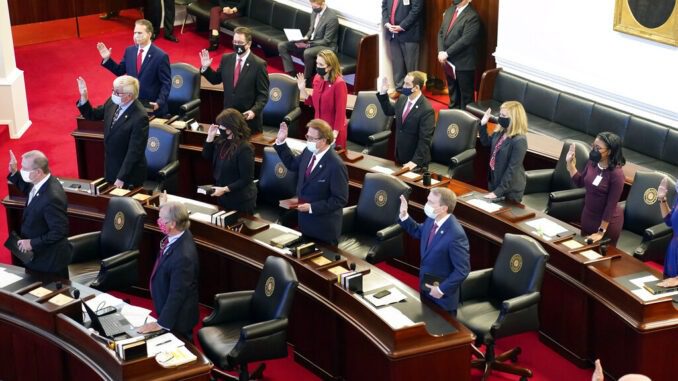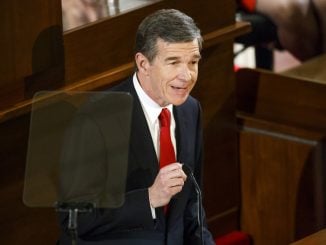
RALEIGH — The decision on getting K-12 students back into the classroom revealed a clear partisan divide last week. During a vote on Senate Bill 37, a bill to get kids back in classrooms for in-person instruction, 16 out of the 23 Senate Democrats voted no.
Four Democrats had excused absences, but only two Democrats, Sens. Ben Clark and Kirk deViere, both from Cumberland County, voted yes. Sen. Michael Lee (R-New Hanover) was the only Republican excused from the vote and the remaining 27 Republicans all voted yes.
“Senate Bill 37 balances the needs of our students with the necessary public health protocols,” Sen. Deanna Ballard (R-Watauga) told North State Journal. “There’s no denying that schools will need to take precautions, that’s why we included specific language about the Strong Schools NC Public Health Toolkit, which was developed by NCDHHS. I believe it’s time to stop making excuses. Schools across the state and the nation have been operating safely for months. This bill is a workable, safe path forward for all students.”
Multiple Democrats tried to amend the bill, such as Sen. Wiley Nickel (D-Wake), who wanted to amend the title to “To Provide at Least One School Nurse in Every School,” and added matching language in the bill text.
Some of the debate on the bill included Democratic claims the measure had no funding, yet the day prior, a bill containing $1.6 billion in COVID-19 relief funding was unanimously passed and sent to the Gov. Roy Cooper.
“My Democratic colleagues continue to say they want students back in classrooms for in-person instruction, but it seems as though despite the science and data that shows we can reopen schools safely, they’re making excuses to continue to hold our children back,” said Ballard. “Just days before the Senate voted to reopen schools, we unanimously passed $1.6 billion in federal funds to help our schools reopen. That’s money that can be used at the discretion of school principals to address the needs of their individual schools, sanitation supplies, and other activities necessary to continue operating.”
In an email response to a constituent obtained by North State Journal, Sen. Natasha Marcus (D-Mecklenburg) claims that one of the “biggest problems” with the bill is that “it creates an insurmountable, unfunded mandate to bring all students with IEPs or 504 plans back under Plan A.”
Marcus did not explain why she believes this is an “unfunded mandate” but last year lawmakers passed HB 1105: Coronavirus Relief Act 3.0, which contained $115 million for education and a “hold harmless” budget provision. The provision allows districts to receive the same level of funding despite drops in their average daily membership enrollment.
Last September, parents in Marcus’ own district filed a lawsuit over the lack of in-person instruction while other parents across the state reported their special needs children were suffering because districts were not delivering on IEPs and 504 plans. Parents told North State Journal remote instruction did not work for their students.
A growing number of lawsuits have been filed over the denial of IEPs and special needs services, including a federal suit filed in the Southern District of New York last fall. That suit, which includes all 100 counties in North Carolina, accuses school districts of violating federal education and disabilities laws by collecting federal education funds meant to provide special needs therapies to students while the districts did not provide the services. Where that federal money is now remains a question.
History Repeating
The day after Senate Bill 37 was filed, Gov. Cooper held a briefing encouraging school districts to return to five-day-a-week in-person instruction. He did not issue an executive order on the matter. Instead, NCDHHS’ Safe Schools NC Toolkit was updated with language that all grades could reopen for in-person learning using certain safety measures.
The N.C. Republican Party pushed back on Cooper for not releasing an executive order.
“The science and data show not only is it safe for kids and teachers to return to schools, but kids are suffering and falling behind with the schoolhouse doors locked,” said NCGOP Communications Director Tim Wigginton. “Cooper needs to modify or repeal his executive orders and put our kids back in school as the science and data show. It is time for Cooper to lead for our kids and stop carrying water for the extreme liberal special interests who want to keep kids out of the classroom.”
The vote came just two days after the N.C. Democratic Party Chair Wayne Goodwin accused Republicans of “playing politics” with school reopenings “by imposing heavy-handed, one-size-fits-all legislative mandates.”
The governor has only shown interest in local control of public schools when it comes to enforcement of his pandemic orders. Most of Cooper’s orders have covered the entire state, including his stay–at–home orders, business closures, the 10 p.m. to 5 a.m. curfew, and the alcohol sales prohibitions, the latter two of which have been renewed multiple times.
During the question-and-answer session on Feb. 2, Cooper said he “hadn’t seen the legislation” yet, but claimed that SB 37 did not follow safety protocols. He did not respond to the follow-up question by the same reporter on whether he would veto the bill.
Senate Bill 37 does follow safety protocols and cites NCDHHS’ Strong Schools guidance, saying that districts “shall comply with all requirements of the Strong Schools NC Public Health Toolkit (K-12), as that guidance existed on December 4, 2020, for implementation of Plan A (Minimal Social Distancing) and Plan B (Moderate Social Distancing).”
“It’s troubling that both Gov. Cooper and Senate Democrats continue to make false claims about the bill,” said Ballard. “It does not force schools into any one plan. Local districts have control over their reopening plans, including offering Plan A, Plan B, or a mixture of the two while allowing families to opt-in to a remote option if they need it. It also allows the flexibility to move to remote-only learning if needed because of quarantines.”
The bill also mentions the CDC’s advice which says that schools can open safely “with mitigation efforts” and that there is “little evidence that schools have contributed meaningfully to increased community transmission.”
The N.C. State Board of Education has not openly commented on Senate Bill 37, but state Superintendent Catherine Truitt says that while the bill still needs to go through the legislative process, “at its center is the desire to get all children back in the classroom so they can start to recover from the learning loss this pandemic has wrought.” Truitt also noted that “current health and safety guidance from DHHS does not allow for this.”



